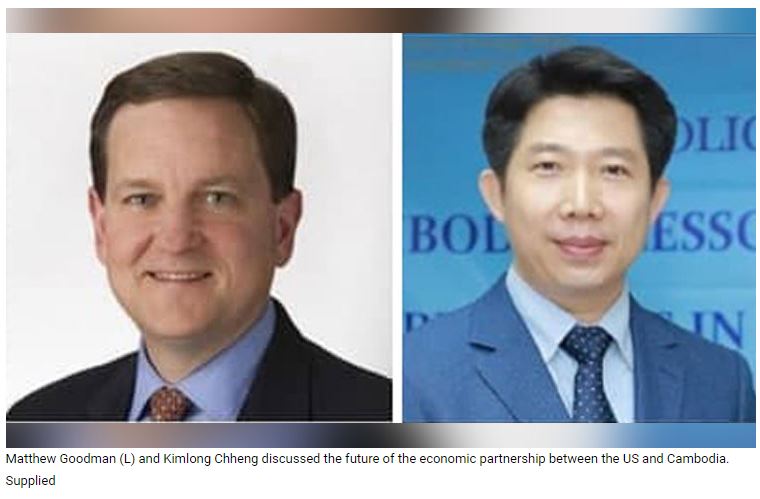Agriculture, e-commerce, geopolitics to colour US-Cambodian trade relations
The future success of the economic relationship between the United States and Cambodia could hinge on managing geopolitical tensions, evolving the agricultural sector and providing clear legal frameworks to improve the investment climate, according to a panel of experts who spoke at a webinar hosted by the Asian Vision Institute (AVI) and the US embassy.
Titled “Economic Engagement with US Companies in the ASEAN Region”, the lecture featured a dialogue between Matthew Goodman, the senior vice-president for Asian Economics and director of the Economics programme at the Center for Strategic and International Studies in the US and Kimlong Chheng, the vice-president of AVI.
Goodman is a former director for international economics on the National Security Council of the US. Chheng is a member of the advisory council at the National Assembly of Cambodia.
The two identified several areas where both the US and Cambodia could engage in mutually beneficial partnerships, including manufacturing, promoting higher-quality agricultural products, capacity-building and developing both digital and physical infrastructure.
Goodman said that the combination of China’s rapid development – which caused labour rates to increase and also created a more difficult market to navigate – and COVID-19 have caused countries to rethink their supply chains.
“I think Cambodia has a big opportunity across manufacturing to try to become a more attractive market for US companies and others to invest in. That requires improvements in Cambodia’s investment climate,” he said.
Besides labour skills associated with manufacturing, Goodman said local employees could have the opportunity to learn soft skills from US-backed companies as well, such as selling and designing products.
He added that the legal framework is “still not sufficiently developed” and pointed to regulatory and bureaucratic issues that limit the attractiveness of the market in US investors’ eyes.
When asked about potential hindrances to fruitful economic cooperation, Goodman said political differences between the countries couldn’t be ignored, including issues surrounding political freedoms and human rights.
“I know there are different perspectives on that, but analytically I would say… I think those issues are going to be an obstacle to deeper relations. I hope that we can find ways to address many of those issues so that we can deepen our trade and investment relations. I think it would benefit both countries enormously,” he said.
Chheng agreed that transparency and predictability within Cambodia, and for all countries, are essential factors that investors take into consideration. He said one of Cambodia’s priorities should be harmonising the legal systems, policies and investment frameworks to entice more foreign direct investment.
In response to potential hindrances, he agreed that political tensions had affected trade between the two countries before. He said it was against Cambodian national interests to align with any one country and that it’s focused on remaining independent and rehabilitating the economy.
“We are a free, independent non-aligned ASEAN member state and Cambodia has been focusing a lot more on economic rehabilitation after many years of civil wars,” he said.
Agriculture was discussed as a potential market for growth. Goodman said demand exists in the US for processed foods, something Cambodia could take advantage of if it introduced new, higher technology into the sector and adopted new production methods.
The US helping to bring some of this technology and talent to Cambodia would present an opportunity to teach new skills and build sorely needed infrastructure backed by US investment.
The youth of the ASEAN population was also described as one of the factors that makes the region attractive to foreign investors.
Chheng said a young population and an increasingly digitalised society present the opportunity for enhanced people-to-people connectivity, something he said should be a main motivating factor for the two sides.
On this point, he proposed the idea of integrating more sister cities between the US and Cambodia to increase connectivity between the two countries, including business to business relations and strengthening the link between ASEAN immigrants living in the US and their home countries.
“At the end of the day, economic cooperation with the US will be to serve the interest of the people of the nation,” he said.
Source: https://www.khmertimeskh.com/50833314/agriculture-e-commerce-geopolitics-to-colour-us-cambodian-trade-relations/


 English
English




